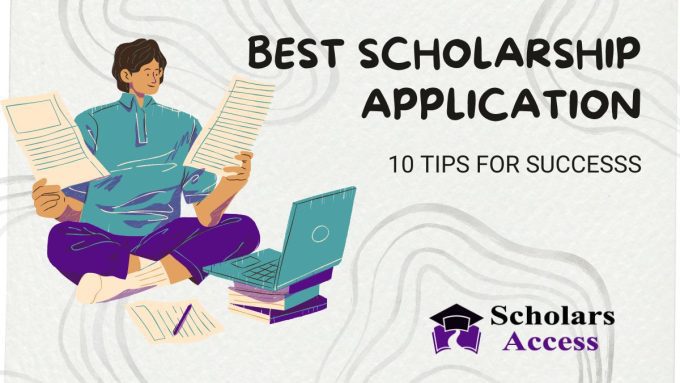How to Prepare for a Scholarship Interview? With the help of these effective techniques, you may reach your greatest potential, win your ideal scholarship, and dazzle any selection panel. Winning a scholarship is more than just submitting a good application—it often requires successfully navigating a scholarship interview. Whether you’re aiming for a fully funded international award or a local academic grant, acing the interview can be a make-or-break step in your scholarship journey.
In this guide, we’ll explore how to prepare for a scholarship interview offline, including expert-approved scholarship interview tips, mock interview techniques, and offline strategies that will help you shine on the big day.
Why Scholarship Interviews Matter
A scholarship interview offers selection committees the chance to evaluate your communication skills, confidence, and passion beyond your written application. This is your opportunity to demonstrate not only your qualifications but also your personality, goals, and fit for the scholarship program.
Unlike virtual interviews, offline interviews add an extra layer of pressure—there’s no screen to hide behind. That’s why offline scholarship interview preparation requires a different approach, one that involves real-world practice and in-person refinement.
How to Prepare for a Scholarship Interview: 10 Rules
Here are the most effective ways to prepare for your scholarship interview offline:
1. Understand the Scholarship’s Purpose and Values
Before anything else, do your homework. Take the time to thoroughly understand the mission, goals, and values of the scholarship provider. Whether the award is based on leadership, community service, academic excellence, or a specific field of study, tailor your preparation accordingly.
Visit your school’s library or guidance office to gather brochures, magazines, or printed scholarship information. Jot down core values and use that to frame your responses.
2. Review Your Application Thoroughly
Many questions in the interview will stem directly from your scholarship application or essay. Review what you submitted, especially your personal statement, list of achievements, and extracurriculars. Be prepared to expand on anything you wrote.
Print out your application documents and annotate them with potential follow-up questions. Practice discussing each point as if you were explaining it in a face-to-face conversation.
3. Practice Common Scholarship Interview Questions
Familiarize yourself with typical interview questions like:
- Tell us about yourself.
- Why do you deserve this scholarship?
- What are your long-term career goals?
- How do you plan to give back to your community?
- Describe a challenge you faced and how you overcame it.
Write these questions on flashcards and practice answering them aloud in front of a mirror or with a friend. Focus on clarity, confidence, and natural pacing.
4. Schedule Mock Interviews
One of the best offline strategies is conducting mock interviews with teachers, mentors, or friends. This simulates a real interview environment and helps reduce nervousness.
Dress formally, create a panel of at least two people if possible, and use a quiet room to conduct the session. Treat it like the actual day—body language, posture, eye contact, and tone all matter.
5. Sharpen Your Storytelling Skills
Scholarship committees love hearing personal stories that reveal character, resilience, or ambition. Prepare two or three key stories from your life that align with the scholarship’s values.
Write down these stories in a notebook, then practice telling them aloud in different ways. Record yourself on a mobile device for playback. Evaluate your delivery, emotion, and coherence.
6. Learn to Manage Nervousness
Stage fright is real, especially in offline interviews. However, you can train your mind and body to remain calm and collected.
Practice breathing exercises, power poses, or visualization techniques before your interview. You can also join a local public speaking club like Toastmasters to improve your poise and presentation skills.
7. Dress the Part
Your appearance sends a message before you even speak. Dressing professionally shows that you’re taking the opportunity seriously.
Try on your outfit days before the interview to ensure proper fit and comfort. Avoid flashy colors—opt for formal, neat, and respectful attire. Iron your clothes and wear polished shoes.
8. Improve Your Non-Verbal Communication
Non-verbal cues such as posture, eye contact, hand gestures, and facial expressions play a huge role in your overall impression.
Practice sitting straight with your feet flat on the ground. Make a habit of maintaining eye contact during daily conversations. Ask a mentor to evaluate your body language during a mock interview.
9. Prepare Physical Copies of Important Documents
Bring several printed copies of your resume, transcripts, recommendation letters, and any certificates of achievement to the interview.
Organize these in a professional folder. Label each section so you can access documents quickly if asked. This shows preparedness and attention to detail.
10. Scout the Interview Location
If you know the venue in advance, it’s wise to check it out before the interview day.
Visit the location ahead of time to understand how long it takes to reach, where to park, and what the room looks like. This helps reduce stress and avoid last-minute confusion.
Scholarship Interview Day: What to Expect
On the day of your interview, arrive at least 15–20 minutes early. Bring your documents, switch off your phone, and take a few deep breaths to relax. Expect a panel of two to five interviewers, depending on the scholarship.
Greet each interviewer with a smile and a firm handshake. Maintain eye contact, listen carefully, and take a brief pause before responding to questions. Keep your answers focused and sincere.
Carry a notepad and pen. It’s acceptable to jot down a question before answering if it helps you stay organized.
Offline Practice Resources for Scholarship Interviews
Here are some offline tools you can use to practice effectively:
- Career Counseling Offices: Most schools and colleges offer in-person counseling services for interview prep.
- Libraries: Find books on communication skills, public speaking, and interview strategies.
- Local Workshops: Look for free or low-cost workshops hosted by educational institutions or NGOs.
- Toastmasters Clubs: Perfect for improving public speaking and leadership through offline practice.
- Peer Practice Groups: Create a study group to simulate interviews and give peer feedback.
Post-Interview Etiquette
Once the interview is over, don’t just walk away and forget about it. Show gratitude and professionalism by following up.
Write a handwritten thank-you note and mail it to the scholarship committee or interviewer. This personal gesture can set you apart from other candidates.
Common Mistakes to Avoid During a Scholarship Interview
- Being underprepared: Never assume your achievements speak for themselves—practice is key.
- Overusing jargon: Keep your language simple and clear.
- Talking too fast: Pace yourself and don’t rush.
- Lack of eye contact: This signals nervousness or lack of confidence.
- Negative body language: Avoid slouching, fidgeting, or crossing your arms.
Sample Offline Practice Schedule (1 Week Plan)
| Day | Task |
|---|---|
| Day 1 | Review your scholarship application and take notes. |
| Day 2 | Practice answering 10 common interview questions aloud. |
| Day 3 | Conduct a mock interview with a teacher or mentor. |
| Day 4 | Work on your body language and record your responses. |
| Day 5 | Scout the interview venue and test your interview outfit. |
| Day 6 | Attend a peer interview session or public speaking meetup. |
| Day 7 | Rest, visualize success, and prepare documents. |
Conclusion : How to Prepare for a Scholarship Interview
Preparing for a scholarship interview offline might seem daunting at first, but with the right approach, you can turn it into an empowering and rewarding experience. These scholarship interview tips are designed to help you build confidence, sharpen your communication, and present the best version of yourself when it matters most.
Remember, offline preparation allows you to practice in real-world scenarios—building authentic confidence that no Zoom call can replicate. So, get started today. Dress up, speak up, and show the scholarship committee why you’re the perfect candidate.














1 Comment